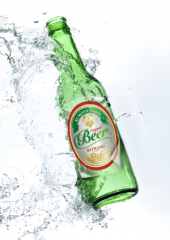RITRAMA PRESENTS RI-MOVE: THE ECO-FRIENDLY ADHESIVE TECHNOLOGY
Ritrama presents RI-MOVE, the new series of paper and film materials specially designed for the labelling of containers and bottles for recycling and reuse.
The legislative objectives in terms of recycling and reuse of packaging are increasingly stringent. Many brands in the food and beverage sector are already working to market products with packaging that is as recyclable and reusable as possible.
Labels and adhesives are among the main obstacles to effective recycling: both components, in fact, if not properly treated or recovered, risk making the entire recycling process less effective. Ritrama therefore makes its technology available to support brand owners with RI-MOVE, a series of self-adhesive materials developed to meet both the most stringent requirements for recycling and reuse of glass and PET containers and the needs of customers.
Ritrama's RI-MOVE range consists of RI-MOVE GLASS and RI-MOVE PET: the first for the labelling of returnable glass containers, the second specifically for PET containers. For both, the special RI-MOVE technology ensures maximum adhesion during the product's life cycle while ensuring fast and clean removal of the label from the container during industrial washing with alkaline solution.
The RI-MOVE Glass series, thanks to the AR816 and WR40 adhesive technologies combined with film and paper face materials, ensures a quick release of the label from the bottle without leaving residues. These adhesives have been designed to remain adherent to the label without leaving any contaminants in the washing system itself. The WR40 adhesive can be virtually combined with any paper front of the Ritrama range.
For clean, fast and easy recycling of PET containers.
RI-MOVE PET's AR842 adhesive is designed to detach from PET flakes allowing polypropylene label fragments to float in the hot alkaline bath during the industrial washing process.
The PET fragments, which are now clean and residue-free, can be recycled to produce the highest quality PET.






